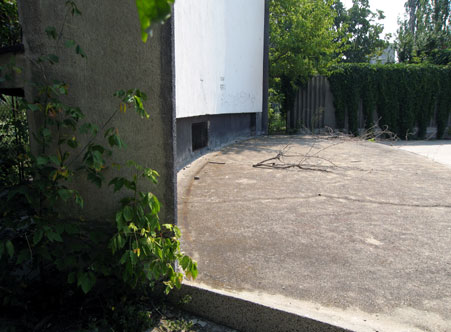
The cinema is opposite the market which is divided into two parts – the official part and the renegade stands trailing along the street away from the market proper. The market has the usual supply of goods – everything from cucumbers to tablecloths; fruit, metal files and fripperies. The sun is directly overhead and although much of the produce is shaded by sheet-plastic awnings, it fills me with childish delight to see one of the stall-holders use an improvised shower to freshen his produce. It’s made out of a plastic bottle pierced all over with a needle.
|
|
The thin jets of water arc through the air. They hit the cucumbers in a fine spray. I stand close enough to catch some of it on my arms. Later L. does in fact buy two tablecloths as potential objects for one of her staged photographs. These can be bought by the meter taken from rolls, and are made of medium-weight, patterned plastic. Made in Turkey, says the salesman, and cuts L. a round one. The synthetic smell of new, super-heated plastic fills the car when we return until we imprison it in a sealed plastic bag.
Back on the road again L. does some filming while I lose myself in thinking about geographical and imaginary border-crossings. How one sees these crossings, the terms in which they are defined and experienced, depends on who you are, not so much as an individual but as a part of a privileged or disadvantaged group. So personal choices and outside circumstances that reflect issues of power between countries and cultures always have to be borne in mind within that context. From what we see here I can imagine that there are many people looking forward to the joining the European Union, driving across the (open, perhaps with qualifications) EU borders instead of confronting the present ones. Poland acceded to the EU in 2004 and now, in 2006 there are places in England, such a Southampton, where the Polish population is about to exceed the 10% mark. Whether they are there as temporary workers or as permanent residents remains to be seen.
As an immigrant to Austria—though a privileged one—I have experienced the mental border crossing between the ‘self-evident belonging’ of home and the ‘qualified belonging’ of abroad, between ‘here I am at home’ and ‘here I have made my home’. Many (especially first generation) incomers live these hybrid identities, holding ‘home’ as a determining social, cultural and political reference while living ‘here’ in a socially, culturally and politically limited present. Perhaps the balance tips when permanent presence is legally assured and the dead are no longer shipped ‘home’ for burial… |